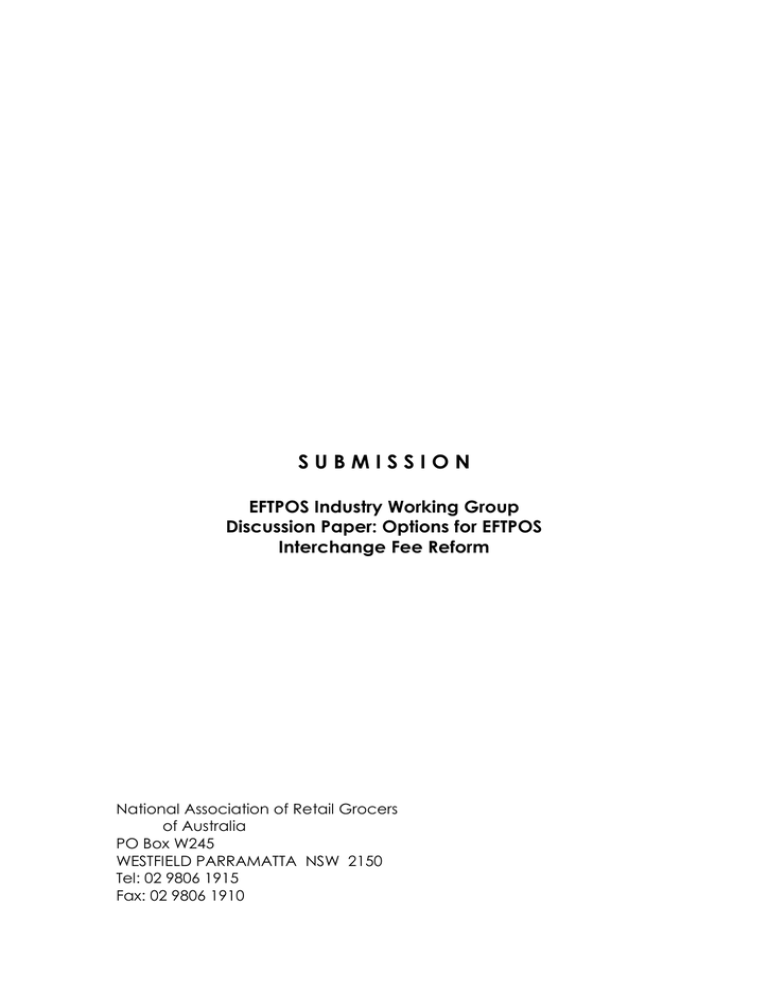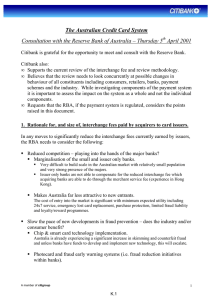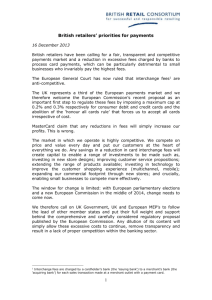S U B M I S S I O N
advertisement

SUBMISSION EFTPOS Industry Working Group Discussion Paper: Options for EFTPOS Interchange Fee Reform National Association of Retail Grocers of Australia PO Box W245 WESTFIELD PARRAMATTA NSW 2150 Tel: 02 9806 1915 Fax: 02 9806 1910 Introduction The National Association of Retail Grocers of Australia (NARGA) represents about 4000 independently owned supermarkets and grocery stores in all States and Territories. NARGA member organisations are: · · · · · · · · IGA Retail Network Food Retailers Association of NSW Master Grocers Association of Victoria Queensland Retail Traders and Shopkeepers Association Small Retailers Association of South Australia WA Independent Grocers Association Tasmanian Independent Retailers Canberra Small Business Council Inc. NARGA appreciates having the opportunity to contribute to the deliberations of the industry working group reviewing EFTPOS interchange fee arrangements. Perceived Problems The industry working group’s Discussion Paper summarises the perceived problems with EFTPOS interchange arrangements as: · Fees set through bilateral contracts have been rigid and appear to lack flexibility to change · Direct network access is linked to successful negotiation of an interchange arrangement · Market and network structure leads to difficulties and inefficiencies in negotiating bilateral interchange arrangements · There is potential for shifting the balance of use away from EFTPOS, particularly in relation to credit cards · There is apparent lack of consistency between EFTPOS payment interchange fees and those for other retail payment types. These perceived problems amount to a strong argument for a transparent, objective, cost-based fee-setting mechanism, which allocates cost on a user-pays basis. These perceived problems, however, are limited to concerns mainly reflecting the interests of the banking industry and focus on interchange arrangements only from that perspective. …/2 2. Observers outside the banking industry might identify other matters requiring consideration in reform of the EFTPOS system, but essentially there are few major problems with the system as it operates within Australia from the point of view of the 4000 supermarkets and grocery stores represented by NARGA. Similarly, the objectives outlined in section 2.1 of the working group’s paper, which focus on possible alternative interchange arrangements, note that “different participants in the EFTPOS network may have differing views on how best to achieve these objectives.” Indeed, some participants might correctly believe that there should be additional and broader objectives based on different premises entirely. The options outlined in the paper, together with their rationales, allocate supposed benefits to merchants and their customers from use of the EFTPOS system while omitting any corresponding benefits which have accrued to the banks. They therefore represent at best a snapshot of the system as it currently stands. The de facto transfer of banking functions, particularly to the retail sector, has allowed banks to close branches and reduce staff and services, with substantial cost savings to the banks. At the same time, the use of EFTPOS payments and cash withdrawals from debit accounts, while reducing (mainly large) retailers’ costs of cash handling to some extent, has also shifted on-going workload to retailers, resulted in additional checkout delays, double debits and other unwanted events leading to customer dissatisfaction. ATMs, EFTPOS and secure debit cards have driven Australian consumers towards electronic banking, reducing banks’ staffing, operational and branch-maintenance costs and increasing profitability. At the same time, retailers large and small, have been obliged to take on some of the infrastructure costs which were formerly borne by banks. Small retailers, in particular, have notably not been compensated for the quasi-banking functions they now perform or the infrastructure they provide. The clear net beneficiaries of the transfer of banking functions via EFTPOS have been the banks. …/3 3. The roll-out of ATMs and EFTPOS terminals, while adding an element of convenience for shoppers, was an initiative of the banking industry and was based upon the prospect of reduced staffing levels, reduced costs and increased revenue to the banks through various fees and charges. The Wallis Committee noted in 1997 that the banks had accrued substantial savings through the system. We note also that the introduction of Visa co-branded multi-function (credit/debit) cards which are being promoted by some financial institutions has raised serious issues which need to be addressed urgently. NARGA is aware that a separate working party has been established to consider such issues. Other interchange reform initiatives NARGA supports the proposition that coordinated implementation of interchange fee reforms across payment instruments is desirable, with a view to minimising operational costs and to reduce the overall impact of reforms on merchants, consumers and financial institutions. EFTPOS in context The EFTPOS Industry Working Group’s Discussion Paper focuses entirely on reform of the interchange fee system as it currently stands but fails to deal adequately with the interests of non-bank stakeholders. NARGA members believe the system requires on-going monitoring and review from a much broader perspective. We are not convinced, however, that the EFTPOS Industry Working Group as it is currently constituted is an appropriate body to perform such a role. NARGA would prefer to see the establishment of a new group with much broader interests from all sectors affected by EFTPOS, preferably under the aegis of the Reserve Bank of Australia. Such a group would include representation of a range of stakeholders, including the banks, large and small retailer organizations, consumer organizations and governments. Such a body should also have a wider brief to keep under review all aspects of EFTPOS and debit card use, including domestic cards and the international “scheme” cards. …/4 4. A review of the broader context in which debit cards and EFTPOS are used would also point to standardisation of a core set of operational features, while allowing each card issuer to add other marketing benefits if it wished. Debit and Credit Cards Debit cards and the EFTPOS system, as they operate in the Australian domestic context, have clear differences from the three-party and four-party credit card systems. Because of the interactive nature of the debit card technology, based on PIN-authorisation and verification of account balances before the transaction is completed, card issuers and acquirers face a lower level of exposure to fraud, lower risk of bad debt, lower marketing costs, no scheme fees and lower costs of operation. Cash advances through retail outlets do reduce merchants’ cashhandling costs marginally, but disproportionately in favour of large corporate retailers. However, participation in the EFTPOS system imposes significant costs on retailers in the form of line and transaction charges and the cost of the purchase or rental and for PIN pads with prescribed minimum security standards. PIN pad costs are not borne by retailers in some other countries. The Australian system, by and large, has proven to be a safe and secure form of transaction, with low levels of fraud. Consequently, the cost of the issuer’s payment guarantee (based on hardware investment by retailers) is very low. By contrast, signature-based credit cards pose a higher risk of fraud and higher costs to the issuer. Cash Out The cash out facility, too, is a benefit to customers and merchants where debit cards are used in preference to credit cards. However, this has directly and significantly reduced banks’ operating costs, allowing them to reduce staff and close branches by transferring such traditional banking functions to retailers. Again, such costs fall disproportionately on smaller retailers. …/5 5. Nowhere in the current system is any allowance made for the benefits which retailers have delivered to the banking industry by taking on these costs and functions. Costs borne by smaller retailers to provide this service to their customers include terminal hardware, data communications facilities and line rental charges, consumables and technical support. Our estimate is that small retailers are paying approximately $35 dollars a months for equipment rental and approximately 20 cents per transaction on average. As noted earlier, were interchange fees to move to zero, the cost of operating the system would not change. It would certainly not reduce acquiring costs. Recovery of such costs would clearly be targeted directly at the retailer and small retailers would face significantly increased costs. Significant cost increases for small retailers would oblige them to consider their options, including refusal to accept debit cards (because the payment method which is currently cheap would become expensive), actively encourage customers to use credit cards or cash, or increase product prices. Refusing acceptance of debit cards would drive customers away from small retailers and is clearly not a practical option. Increased use of cash is not a desirable option for small retailers. The cost of cash falls disproportionately on small retailers. Small retail outlets cannot afford the costs of security (physical or electronic), increased insurance costs, increased accounting costs, or the likely higher incidence of employee theft or armed robbery. Debit cards at present remain the cheapest and best payment option for small retailers. Any significant change in the use of debit cards would severely damage their competitive position, at the very least because higher costs would need to be passed on to consumers in higher product prices (exacerbated by GST). Clearly, debit and credit card systems operate in significantly different circumstances and with very different cost structures for issuers and acquirers. There can be no justification, therefore, for applying credit card interchange arrangements and fee flows to debit cards. …/6 6. Interchange fees The vast majority of small retailers receive little or no benefit from interchange fee arrangements and in fact pay a debit card fee for every transaction. However, the interchange fee system, as it currently operates, covers the cost of operation and maintenance of the system, with additional cost burdens beyond system costs (ie, PIN pads, line costs, etc.) being borne by retailers and consumers. In our view, any changes now to be made to the system should be in line with the RBA’s recently announced principles for credit card interchange fee reform: that is, interchange fees should be set transparently and based on objective assessment of costs for all participants in the system. Exposure of Merchants Merchants are further exposed to cost increases because of the requirement that merchants honour all cards, thus allowing issuers to release new card products without consultation with either merchants or regulators and without their approval or agreement. The opportunity remains open to issuers to use such new products to impose higher levels of fees than apply to existing cards. In our view, this alone is reason for intervention by the Reserve Bank of Australia to impose a standard set of operating rules for all debit and debit/credit co-branded cards. Retailers are currently exposed to any such behaviour by card issuers. Conclusion NARGA member organizations broadly support the EFTPOS/debit card system as it currently operates but believe the establishment of a broadly based standing committee including representatives of all stakeholders under the aegis of the Reserve Bank of Australia would give greater opportunities for maintaining confidence in the system. Further, the principles for interchange fee setting established by the RBA in its recent review of credit card interchange fees should apply to the debit card system: interchange fees should be set in a transparent way, based on objective costs and benefits for all stakeholders. …/7 7. NARGA does not support the abolition of interchange fees in the debit card system because the acquirers’ costs would remain and would be most likely to be passed on to retailers and result in significant increases in transaction charges or infrastructure rental costs. Any major change to the current system is likely to result in cost increases and changes in consumer preferences for payment methods (ie, credit cards, cash) which would put smaller retailers at a significant competitive disadvantage. The banks have been the major beneficiaries of the EFTPOS/debit card system and a reassessment of those past and on-going benefits, such as the shifting of quasi-banking functions to retailers, with consequent branch closures, staff reductions, and lower recurrent costs, should see retailer costs reduced. Merchants are currently exposed to unfair practices by banks because the requirement that merchants honour all cards opens the way for banks to introduce new products with new and significantly higher fees and charges without consultation with or agreement by retailers. The Reserve Bank of Australia, in our view, should take a more direct role in ameliorating the problems which currently exist in relation to such arrangements, including the co-branded credit/debit cards which allow customers to avoid modest EFTPOS charges by converting them to higher charges for retailers.





